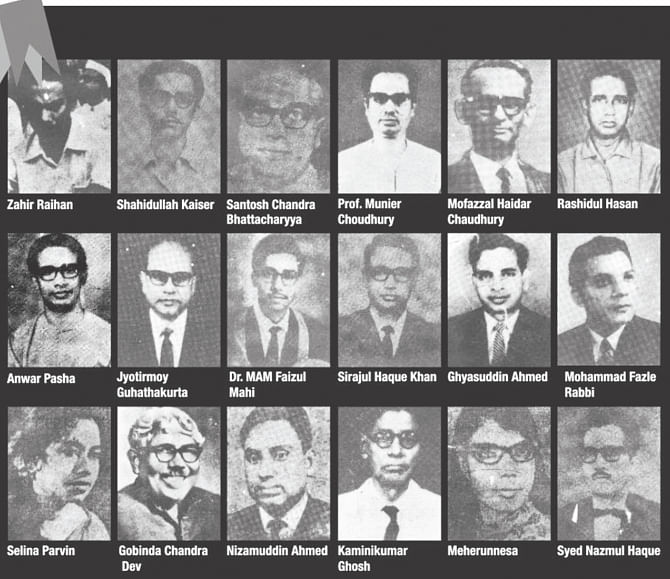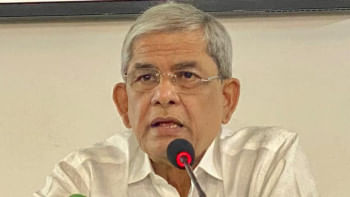The Heroes of a Forgetful Nation

In 1947, people of Bangladesh (then East Bengal) voted for Pakistan which resulted in its geographical unison with Pakistan as one state. Their aspiration was to live in an independent and harmonious land with dignity and rights. But soon after the partition of Indian subcontinent, it became evident that Pakistani leaders had other plans on their mind. The colonialist Pakistani leaders mostly of military background wanted Bangladesh's soil, not its people. By this principle they started to exploit the country ruthlessly. Bangladesh's (then East Pakistan) jute and agricultural harvests adorned West Pakistan's new capital Islamabad, fed its 50 million people, but the majority 70 million people of East Pakistan remained deprived and left out as before.
To make matter worse those Pakistani leaders decided to annihilate Bengali culture by inserting and imposing their alien cultural dogma. Thus a cultural war between Bengalis and West Pakistanis broke out as early as in 1948 when the question of state language was put forward. Bengali scholars, academicians, students, journalists and cultural activists formed cultural groups, organisations and protested against Pakistani's aggression on Bengali culture. The historic language movement led by Bengali intellectual community was the brightest illustration of this cultural war.
So this community of intellectuals who had been working as the guardians of Bengali cultural heritage were blacklisted by the Pakistani military dictators. When Pakistanis finally attacked the Bengalis on March 25th 1971 the first victims of the atrocity were these golden sons of our soil. One of the prime objectives of Pakistan army's operation searchlight was the occupation of Dhaka University campus, the home of Bengali intelligentsia.
On 25th March, armed with tanks, mortars and armoured vehicles Pakistani military convoy encircled Dhaka University campus from three sides (Witness To Surrender: by Siddiq Salik; Chapter: Operation Search Light-1). After devastating bombardment from tanks and artillery, infantrymen marched into the campus and started the brutal massacre. On the first night they killed 10 teachers of the university with hundreds of students and other staff. Professor Fajlur Rahman and his two relatives were killed at building 23 situated in Nilkhet Teacher's Quarter. The soldiers called on Professor Abdul Muktadir of geology department and shot him at point blank range. His body was found at Jahurul Huq Hall (then Iqbal Hall). Professors A.R. Khan Khadim and Sharafat Ali of Mathematics department were killed in Dhaka Hall (now Shahidullah Hall). (80 Years of Dhaka University by Professor Rafiqul Islam)
The army then attacked Jagannath Hall with meticulous brutality. The army killed former Provost and famous professor of philosophy department Dr Gobinda Chandra Dev with his Muslim adopted daughter's husband. Then they killed Dr. A.N.M. Manirujjaman, Professor of Statistics department, along with his son and two relatives. Professor Jyotirmoy Guhathakurta the then provost of Jagannath Hall was severely injured by the initial attack and died in the hospital later (Muktijuddhe Shaheed Jagannath Hall by Ratanlal Chakrabarti). In a video secretly filmed from Jagannath Hall's adjacent Engineering University rooftop, we can still see a part of the dreadful massacre. Some unarmed people were lined up and one of them fell on a soldier's feet and begged for his life. Kicking him off to the line the indifferent soldiers gunned them down and bayoneted the bodies to ensure that they were all dead.
Many teachers escaped the massacre fleeing from their home in the university area. There were also journalists and cultural activists who had been supporting the liberation movement through their diversified activities. So after the purges of 'Operation Searchlight', Pakistan army prepared a blue print to eliminate all of these intellectuals systematically. Major General Rao Farman Ali prepared a list of those surviving Bengali intellectuals. Pakistan army and its local collaborators were instructed to kill the intellectuals according to the list. Pakistani civil servant Altaf Gauhar recounted the incident from his memory. One of Gauhar's friends told him that a hit list had been drawn up for elimination of certain Bengalis. A friend of that person was also on the list and he requested Gauhar if he could do something to save his friend. Gauhar then took the matter to one of his close friends who was a common friend with Major General Rao Farman Ali. Gauhar's friend met with Farman and requested him to drop the name from his hit list. ”Farman took, said Gauhar's friend, a diary out of his drawer and crossed the name out. The name was of Mr Sanaul Huq and he was spared." After the war the half burnt diary was recovered from the ruins of the Governor's house. The copy of a page from the diary shows the list of intellectuals from Dhaka University. 14 of them were killed on December 14, 1971. (Mamoon, Muntassir; translation by Kushal Ibrahim (June 2000). The Vanquished Generals and the Liberation War of Bangladesh (First ed.). Somoy Prokashoni. p. 29).
The Pakistani intention behind this massacre was evident. When they realised that they were going to lose the war, they decided to eliminate the brains behind the liberation movement. They began this job in 25th March and on 14th December they draw the finishing line by murdering most of the intellectuals. They also killed many other scholars and intellectuals who were not at all politically involved. They killed them to wipe out our intellectual resources to quench their racial hatred towards Bengalis.
Unfortunately now it seems that we have almost forgotten their contributions to our nation which ultimately cost their lives in the war. Dr G C Dev was one of the leading philosophers from this subcontinent whose works on Idealism and Humanism had been acclaimed around the world. His memoirs The Philosophy of My Life (1960) and his analytical work Parables in the East were of great research value. But apart from academicians very few people of this generation know about this great scholar.
We all know Altaf Mahmud's epic work Amar Bhaier Rokte Rangano thanks to the global recognition of 21st February as the International Mother Language Day. But how many of us know about this great musician who composed for 19 films in Bengali and Urdu? His patriotic songs aired by Swadhin Bangla Betar Kendro inspired millions of Bengalis and freedom fighters. He turned his place at 370 Outer Circular Road into a secret hideout of an elite guerrilla team of the freedom fighters called 'Crack Platoon'. The house has been destroyed a long time ago. Couldn't we preserve that house to remember the struggle and sacrifice of our freedom fighters?
Jogesh Chandra Ghosh's lifetime effort Shadhana Aushadhalaya, one of the pioneers of alternative medicine in this subcontinent, has been running dimly without any support from the government. Shahidullah Kaiser the journalist and author who had shaken the citadel of Pakistani dictators through his novels and articles is now remembered only occasionally on 14th December. We can republish his novels and articles. We can translate them into English and other languages to disseminate his spirit of independence to this generation.
Whenever our youngsters hear the name of Munier Chowdhury they can only recall two of his plays Raktakto Prantor and Kobor as they have to read these two to pass the SSC and HSC exams. A large part of our youth doesn't need to utter his name during their entire student life. But this great personality had worked all through his life to shape our people's mind for the struggle of independence. His literary works such as Dandakaranya, Mir Manash, Palashi Barrack o Annanya were the conveyers of the essence of liberation. Many of his books and articles contributed a lot to develop a standard Bengali language and that contribution was vital at that time to protect our language from the cultural aggression of West Pakistan. But nowadays very few people know about those contributions of Munier Chowdhury.
Without Mofazzal Haider Chowdhury's efforts and extensive researches a large part of Bangladesh's folk art would be lost forever. We are losing a lot by neglecting his research on Bengali language, Bengali folk literature and colloquial Bengali linguistics which could teach us a lot about our national culture and identity. Anwar Pasha was one of the leading literary figures in the history of Bengali literature. His contribution in translation of ancient and medieval Bengali poems is remarkable. His literary works including novels, essays, short stories and poems played a vital role in the rise of Bengali nationalism. But in today's literary festivals or in book fairs, nobody discusses about his works.
All through his life Jyotirmoy Guha Thakurta, a renowned scholar of English literature of Dhaka University has tried to instil humanist ideals among his students. But it seems that we have erased his ideals from our mind along with his memories as well. Not only these scholars and literary figures but also many journalists like Nizamuddin Ahmed, Selina Parvin and Shahid Saber sacrificed their lives but did not compromise with the oppressors. Doctors like Mohammad Fazle Rabbi have been killed for providing medical treatment to the freedom fighters. Teachers like Dr MAM Faizul Mahi and Dr Sirajul Huq Khan have been murdered for helping the freedom fighters. So forgetful a nation we are that we have almost forgotten many of our intellectual's name and contribution who were killed for their contributions during the liberation war. They are the people who silently worked for our independence and sacrificed their lives. All of them died during the nine months of the liberation war. Even dead bodies of many of these intellectuals could never be found.
Today we have only their names and scholarly works with us. Now it is our duty to disseminate their works among our current and future generations. It is their literary works which once had sparked our movement for liberation and it is their works which actually contained the true spirit of our great liberation war. We have been offering floral wreaths to the martyred intellectual memorial on 14th December which we leave in garbage all the year round and clean hastily on the eve of 14th December. But besides offering this symbolic honour we have no noticeable initiative to recognize the contributions of these great sons of our soil. We shall be able to pay true homage to these heroes if we can keep them alive among our people through their works and ideals.
Feature writer of the Star Magazine.

 For all latest news, follow The Daily Star's Google News channel.
For all latest news, follow The Daily Star's Google News channel. 



Comments